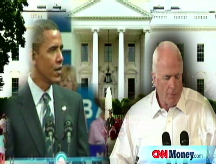Cooler heads, calmer credit markets
A proposed $700 billion government bailout restores investors' appetite for risk and eases demand for Treasurys.
NEW YORK (CNNMoney.com) -- The credit crisis is nowhere near over, but some sanity was restored to the Treasury markets Monday.
After the bond market endured one of its most tumultuous periods last week with huge swings in both directions, demand for Treasurys eased as investors cheered the government's proposed bailout and felt a renewed confidence in riskier arenas.
"There will still be some demand for Treasury bills for a while, but the bailout should help calm the markets a bit," said Steve Van Order, chief fixed income strategist at Calvert Funds.
Many of investors' doomsday scenario fears were allayed over the weekend, when Treasury Secretary Henry Paulson unveiled details of the government's proposed plan to rescue the financial industry.
The bailout would authorize the Treasury to buy up $700 billion of failed mortgage assets from financial institutions, with the intention of restoring much-needed liquidity to the strangled markets.
Though the proposal faces several hurdles in Congress before it is enacted, the idea of a bailout led some investors to take their money out of the fallout shelters of government bonds.
"What we do know is something will get done even if there's nothing concrete," Van Order said.
The benchmark 10-year note dropped 17/32 to 101, and its yield rose to 3.88% from 3.81% late Friday. Bond prices and yields move in opposite directions.
The 2-year note fell 1/32 to 100-11/32, and its yield rose to 2.20% from 2.23% late Friday. The 30-year bond dropped 1-3/32 to 100-27/32, while its yield rose to 4.45% from 4.39%.
The yield on the 3-month Treasury bill, which hit a 68-year low last week, rose to 0.94% from 0.91% late Friday.
Still, there will be more bumps in the road, experts say.
"Treasurys will still be subject to flights in and out," said Van Order. "A lot has happened in the past week, but there's still a lot to work through."
Underscoring the still uncertain future in the markets, software makerMicrosoft Corp. (MSFT, Fortune 500) said Monday it would invest in the Treasury market for the first time in company history. That led credit raters Standard & Poor's and Moody's to bestow a perfect 'AAA' credit rating on the company - the first non-financial institution to receive a perfect rating in nearly 10 years.
Also weighing on the bond market Monday was concern about just how the government plans on paying for all of this. After a $200 billion bailout of mortgage finance giants Freddie Mac and Fannie Mae, an $85 billion loan to crumbling insurance firm American International Group (AIG, Fortune 500) and now a $700 billion industry-wide bailout, the Treasury is going to have to issue a lot of debt in the form of bonds.
In fact, the Treasury has already started a special program of bond sales to raise money for the Federal Reserve's rescue plans. That increased supply helped send bonds lower, even as stocks fell sharply Monday.
"People are concerned about the supply of Treasurys from the mother of all bailouts," said Michael Cheah, bond fund manager at AIG SunAmerica.
As a result, yields rose way off the lows they hit last week. The yield on the 10-year benchmark Treasury hit a five-year low of 3.25% Tuesday, and the 3-month yield fell all the way to 0%. Analysts say yields will continue to improve in the long term.
"Fundamentally, yields should be higher," said Van Order. "With the amount of financing that needs to be done, that should put added pressure on the bond market." ![]()


